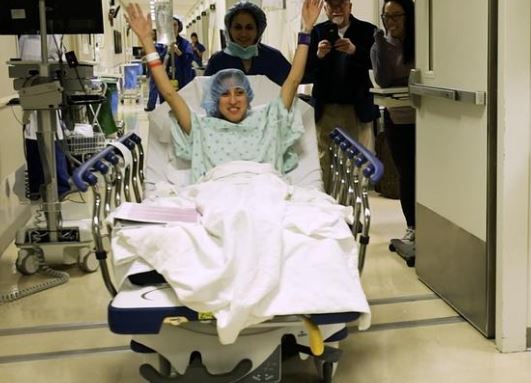A medical milestone was achieved in Baltimore at the Johns Hopkins Hospital. Surgeons performed what has been termed as the first kidney transplant from an HIV-positive living donor. A new dawn for HIV patients who need kidney transplants.
Motivation

Image of Nina Martinez provided by Johns Hopkins Medicine
The donor- Nina Martinez traveled to the hospital to donate her kidney in the hope that she could make a difference in someone else’s life. To show that someone living with HIV can be healthy enough to donate a kidney while still alive and fight the stigma surrounding HIV Infection. To Nina, this was an opportunity to live just like everybody else and change people’s perceptions.
35-year-old Martinez, a public health consultant, and a clinical research volunteer was interested in being a live donor long before the HIV-to-HIV transplants were started. She was motivated by a friend who asked her to be a donor and she contacted professionals to know if she was viable. It took nine months of testing and analysis to verify that she was fit to donate. Unfortunately, her friend had passed on. In her friend’s honor, she decided to donate her kidney to someone else.
History
Hopkins was the first institution in the U.S. to get approval for HIV-positive transplants in 2016. This was after a successful transplant of a liver from a deceased HIV patient to an HIV recipient. They also did a kidney transplant of the same nature. Since 2016 over 116 liver and kidney transplants have been performed across the U.S.
Concerns
There were concerns from the organization overseeing the transplant process. No known risks were established about the implication of organ transplant to recipients with a different strain of HIV virus. So far there haven’t been problems reported. Doctors have remained hesitant about allowing HIV-positive people from donating kidneys fearing that the remaining organ could be at risk of the HIV virus or be damaged by medications used to treat it previously. Newer HIV medication has been considered safe after being tested on over 40,000 patients. If the patients are living with a well-controlled HIV and no additional kidney-harming conditions, they face the same risks as HIV-negative patients during transplant.
Milestone
The surgery performed on Monday, March 25th, 2019 is a medical milestone. There is no count of the number of HIV-positive patients on the kidney waiting list that is 113,000 long. Having an alternative will reduce the long list.
Only recently have HIV-positive patients been able to receive organs from deceased donors with HIV. Such organs were normally thrown away. There are potentially thousands of HIV-positive people who would consider being donors. Nina Martinez’s surgery has opened doors to giving them a chance to help those in need
Nina made it her life’s work to give her kidney in honor of losing her friend to both kidney failure and HIV as well. Taking the initiative to seek medical attention has born a new transplant era. Johns Hopkins urges other hospitals to consider the same approach.
References
Johns Hopkins surgeons perform world’s first kidney transplant from living donor with HIV
Locke, Jayme E., et al. “Immunosuppression Regimen and the Risk of Acute Rejection in HIV-Infected Kidney Transplant Recipients.” Transplantation, vol. 97, no. 4, 2014, pp. 446–450.
Singh, Jerome Amir. “Organ Transplantation between HIV-Infected Patients.” The Lancet, vol. 375, no. 9713, 2010, pp. 442–443.
Touzot, M., et al. “Renal Transplantation in HIV‐Infected Patients: The Paris Experience.” American Journal of Transplantation, vol. 10, no. 10, 2010, pp. 2263–2269.
FEEDBACK:



